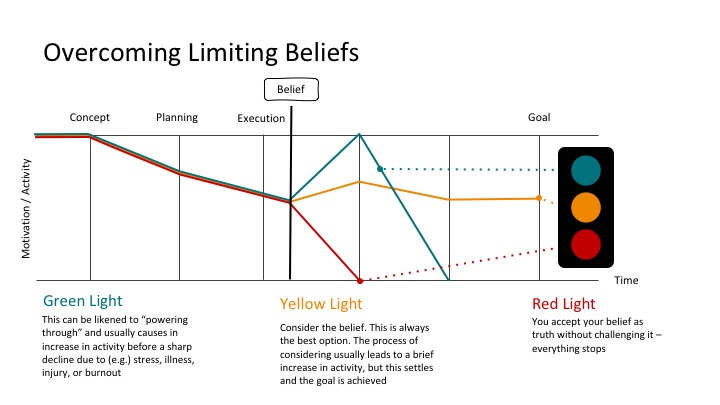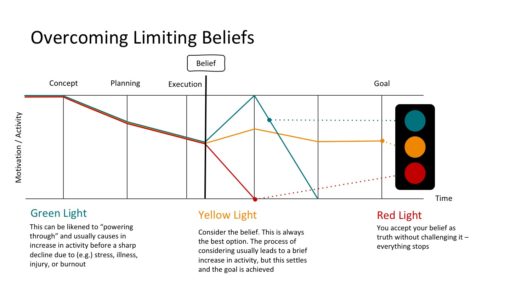In this post I’m going to be focusing on how limiting beliefs can stop us from achieving the goals we have for our lives, and the functions (purposes of God) we should be engaged in.
I guess a good place to start would be to mention that there are also limiting beliefs that stop us from beginning a project all together, but that’s a different topic for another day; most of us don’t struggle with starting, we struggle with continuing or executing our plans.
Here’s my definition of limiting beliefs:
Limiting beliefs are the things, or beliefs, that we accept are true, usually without proof, explanation, or challenge that govern the outcomes of our life
As a Christian, I hope this definition can start to help you to realise just how problematic limiting beliefs can be…nothing should govern us except God!
So back to my graph, this is my theory for how we tend to handle our limiting beliefs when they pop up; I call this my traffic light theory that shows the three ways we generally tend to manage (or not manage) our limiting beliefs.
The y axis is measuring our activity or motivation levels; this is usually high when we have a new idea, or goal. I also call this the concept phase
In the concept phase, we’re at the start of our journey and we’re most excited because the idea comes with a burst of energy and motivation.
We then enter the planning phase. This is where we have to start fleshing out the concept. As you can see on the graph, motivation and activity is still high, however it does dip a little bit. Planning is harder.
I believe some causes of the dip are the realisation of the amount of work, money, time, and learning we may need to put into achieving our goal – it suddenly isn’t as exciting anymore, and more time has passed. I also believe this is the phase that we spend the most time in.
In terms of our limiting beliefs, they subconsciously are manifesting during this phase. When we start to plan, we are actually challenging the status quo or routines of our life, and challenging our habits. We are creatures of habit, and the natural thing for our minds to do is to stay safe, and predictable. Our limiting beliefs subconsciously want to keep us in our safe zone, because then we can’t experience judgement, harm, or failure. We also can’t succeed, however.
If we manage to successfully plan, we can then transition into the execution phase; again, activity and motivation drop during this time, just because it is hard. We are expending the most energy to execute our plans.
Once we execute our plans, our limiting beliefs become a conscious thought and tangible feeling that we cannot ignore
My theory is that we are then faced with three main ways we manage (or not) these thoughts, and they all produce very different results. Red light, green light, yellow light.
Let’s use the example of a limiting belief that says “I’m not smart enough to do this”
If we red light our limiting belief, we accept it as true and don’t challenge it. When studying a new course, red-lighting this belief would mean we stop engaging in the curriculum, stop taking notes, and stop engaging in the learning process. We switch off so much from the learning process that even when we try to study, nothing “goes in”. The result? we don’t pass, and we don’t reach our goal.
Using this same limiting belief, we could also green-light it and this would be us “powering through”. That would probably look like either not studying because we are telling ourselves we know it already to compact the thought we’re not smart enough, or obsessing over studying. Powering through usually leads to us inevitably stopping anyway due to stress, burnout, or illness.
So what happens if we yellow-light this belief? I believe yellow-lighting is the option we should be taking. To yellow-light this scenario, we consider the belief. Is it true? Where did this thought come from? What evidence do I have in my life to refute or confirm it that isn’t from a negative experience in childhood? (I don’t go into this too much in this episode because I want us to focus on the theory…the application of it is coming in my next episode).
When we can begin to challenge our limiting beliefs, we can respond to them in a healthy way that doesn’t mean we stop or we burnout. challenging the limiting belief in this scenario would probably lead to you realising that you may have a negative association with studying due to past experiences. But those experiences won’t necessarily be true now. You’re older, smarter, and wiser. Challenging this belief would lead to you learning how you learn so you can work smarter as you work harder. Challenging this belief will lead to you being humble enough to approach a friend or supervisor to say, “I’m struggling a bit, can you help me?”.
And this is how challenging your limiting beliefs means the goal is completed.
Don’t just accept the belief as true. Don’t just power through.
Do what it says in 2 Corinthians 10:5 and hold every thought captive under the light of the gospel!
I look forward to going deeper into this topic on future episodes




